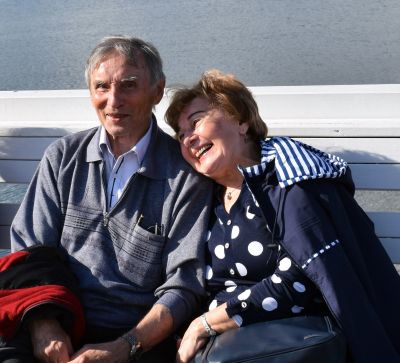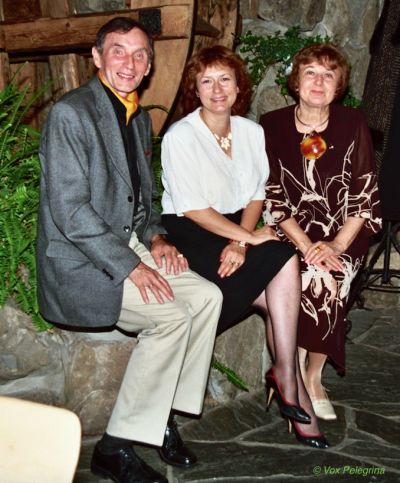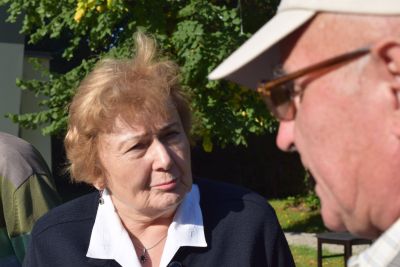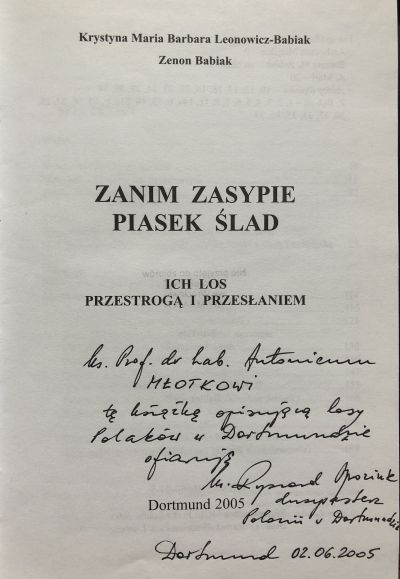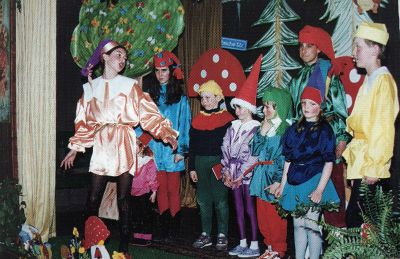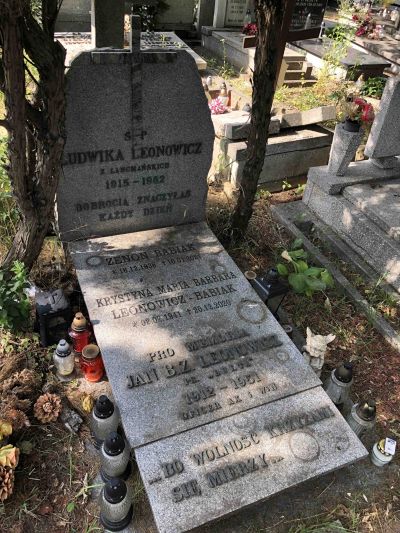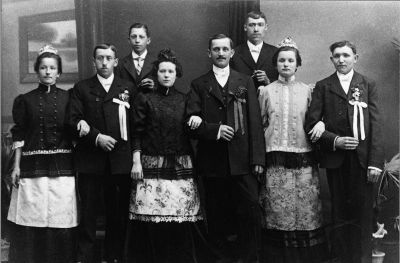Krystyna M. B. Leonowicz-Babiak (1941–2020) and Zenon Babiak (1938–2021) – “I have never felt indifferent towards a Pole...”

Krystyna Maria Barbara Leonowicz-Babiak was born on 2 February 1941 in Kolonia Nowosiółki near Tomaszów Lubelski. Her early childhood was inextricably linked to the partisan activities of her father Jan Leonowicz, whose codename was Burta. Above all, she remembered the frequent house searches, that the family often had to flee their home (sometimes in the middle of the night), and that overall, she didn’t feel safe. Her father was killed on 9 February 1951 during an ambush in the village of Nowiny.
In 1958, she took up studies at the Faculty of Natural Sciences at the University of Wrocław (Wydział Nauk Przyrodniczych Uniwersytetu Wrocławskiego), successfully completing her degree in 1963. From 1963–1965, she worked as a scientific-technical assistant at the Institute for Laboratory Diagnostics at the Higher Agricultural School in Wrocław (Zakład Diagnostyki Laboratoryjnej Wyższej Szkoły Rolniczej we Wrocławiu), from 1965–1967 as a scientific-teaching assistant at the Institute of Biology at the Medical Academy of Wrocław (Zakład Biologii Akademii Medycznej we Wrocławiu), and from 1967–1971 as a doctoral student at the department of plant physiology at the University of Wrocław (Katedra Fizjologii Roślin Uniwersytetu Wrocławskiego). In 1971, she gained her doctorate in the natural sciences. She then worked as an academic teacher (from 1973–1975 as assistant professor at the Institute of Biology and Environmental Protection at the Technical University of Wrocław (Zakład Biologii i Ochrony Środowiska Politechniki Wrocławskiej), and from 1975–1989 as assistant professor at the Institute of Biology Didactics at the University of Wrocław (Zakład Metodyki Nauczania Biologii Uniwersytetu Wrocławskiego)). She wrote and co-authored nearly 100 scientific publications and a book (Wybrane zagadnienia z ekologii. Hodowle i ćwiczenia, Warsaw 1985).
Krystyna Leonowicz-Babiak’s greatest passions included journalism, painting and poetry. She wrote articles for numerous newspapers, including: “Głos Polski” (“The Voice of Poland”) “Nasza Rota” (“Our Group”), “Nasze Słowo” (“Our Word”) and “Teczka” (“Briefcase”). She is the author of the following volumes of poetry:
Moje ogrody, Wrocław 2001.
W pejzażach słów, Wrocław 2002.
Chwile zebrane, Wrocław 2013.
Figle futrzaków, Wrocław 2014.
The anthology A duch wieje kędy chce ... Almanach poezji religijnej, Lublin 2016, also offers an insight into Krystyna Leonowicz-Babiak’s work.
She wrote the lyrics for the hymn of the Polish Centre for Schools and Education in Germany (Polska Macierz Szkolna w Niemczech), of the Holy Stanisław Kostka Grammar School and Lyceum no. XXI in Lublin (Gimnazjum i XXI Liceum im. Św. Stanisława Kostki w Lublinie) and of the “Wisełka” folklore society in Dortmund. She was a member of the alumni association of the University of Wrocław (Towarzystwo Absolwentów Uniwersytetu Wrocławskiego), the Polish association for authors, journalists and translators in Europe (Polskie Stowarzyszenie Autorów, Dziennikarzy i Tłumaczy w Europie), the society of Polish writers abroad (Związek Pisarzy Polskich na Obczyźnie) and many other social, cultural and academic organisations. From 1994 to 1995, she headed the Family Theatre (Teatr Rodzin) in Dortmund, where she was the stage director.
Her paintings were exhibited in Barcelona, Dortmund, Leszno, Recklinghausen, Wrocław and elsewhere.
Krystyna Leonowicz-Babiak died on 20 December 2020. She was buried at the Holy Family Parish Cemetery (Cmentarz Parafialny św. Rodziny) in Wrocław (sector 12, row 70).
***
Zenon Babiak was born on 16 December 1938 in Jarczowce, in the Tarnopol district, voivodeship of Lwów (Lviv). In 1945, he was relocated to Lower Silesia, where he began his school education. He attended the main school in Byczyna and the general lyceum in Cieplice Śląskie. In 1956, he took up studies at the Faculty of Mechanics of the Technical University of Wrocław (Wydział Mechaniczny Politechniki Wrocławskiej), which he completed in 1961. During the same year, he began work at a metal processing factory (Fabryka Urządzeń Mechanicznych) in Wrocław. During his time as a student, Zenon Babiak’s interest in the sciences deepened. This would later influence his career. In 1962, he completed a work placement as an assistant; from 1963–1965, he already worked as an assistant, and from 1966–1972, he was promoted to senior assistant. He worked in the Faculty of Metal Technology under Władysław Kaczmar. In 1972, Zenon Babiak gained his doctorate at the Faculty of Mechanical Engineering at the Technical University of Wrocław. For many years, he worked in research: from 1973–1985 as assistant professor at the Technical University of Wrocław, from 1985–1990 as a research assistant at the University of Dortmund, and from 1991–1995 at the Ruhr University in Bochum. He also worked in Braunschweig (1996–1997), Clausthal-Zellerfeld (1998–2002) and Hanover (from 2003). He wrote and co-authored numerous articles and books (Technologia spawania. Praca zbiorowa, ed. W. Kaczmar, Wrocław 1974; Technologia maszyn. Spawalnictwo, ed. W. Kaczmar, Wrocław 1979).
Zenon Babiak was a member of the Lower Silesian section for welding technology of the Association of Polish Engineers and Mechanical Technicians (Dolnośląska Sekcja Spawalnicza Stowarzyszenia Inżynierów i Techników Mechaników Polskich) and also of the Society for the Promotion of Polish Culture and Language (Stowarzyszenie Krzewienia Kultury i Języka Polskiego) in Dortmund, as well as the Polish Association of Authors, Journalists and Translators in Europe (Polskie Stowarzyszenie Autorów, Dziennikarzy i Tłumaczy w Europie), which is based in Paris. He actively participated in social projects, supported his wife in her work, and pursued his greatest passion, which was photography. Zenon Babiak was chairman of the parish community council of the Polish Catholic Mission in Dortmund, and a co-founder (together with his wife) of the Polish Language School at the Polish Catholic Mission. He received multiple awards from the rector of the Technical University Wrocław (Politechnika Wrocławska) for his scientific work, and was presented with the golden badge of honour from the trade union of Polish teachers (Związek Nauczycielstwa Polskiego).
Zenon Babiak died two weeks after his wife, on 10 January 2021. He was buried next to her in the Holy Family Parish Cemetery (Cmentarz Parafialny św. Rodziny) in Wrocław.
